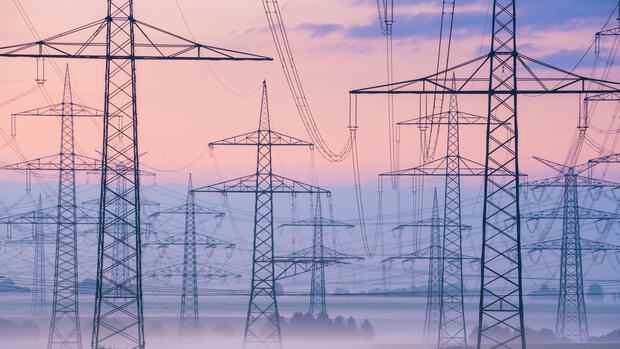The expansion of the energy infrastructure is years behind the plans.
(Photo: Photodisc/Getty Images)
Berlin The German Energy Agency (Dena) advises a change of course when planning energy networks. For electricity, natural gas, heating and hydrogen networks, there should be a “system development plan” (SEP) in the future, which will link the projects that have been running in parallel to date.
This is the result of the “Dena Network Study III”, which the federal agency presented on Tuesday. “Integrated energy infrastructure planning is crucial for a successful cross-sectoral energy transition. The various energy networks must no longer be planned based on different assumptions,” said Dena boss Andreas Kuhlmann. A common basis is needed that takes the big picture and the climate goals for the year 2045 into account.
A rapid expansion of the energy infrastructure is considered a crucial prerequisite for becoming climate-neutral. So far, however, the expansion has stalled. Although politicians have tried several times to simplify planning procedures and to standardize and accelerate approval processes, the expansion is lagging behind the goals.
The challenges are also growing because the expansion of renewable energies is to be drastically accelerated. The more renewables are connected to the grid, the greater the need for grid expansion. In addition, the goal of the traffic light coalition to bring forward the phase-out of coal-fired power generation from 2038 to 2030 increases the pressure to make progress with grid expansion.
Top jobs of the day
Find the best jobs now and
be notified by email.
Grid expansion enjoys high political priority. In his recently presented “opening balance sheet”, Federal Minister of Economics Robert Habeck (Greens) draws a critical conclusion: Of the 11,500 kilometers of urgent expansion projects for the electricity transmission network, 8948 kilometers have not even been approved. Delays of several years are imminent.
Energy Agency wants to make the grids more efficient
Dena has been an important source of inspiration for network expansion for years. As early as 2005, with its first grid study, it laid the basis for higher demands in grid expansion. According to the ideas of the Energy Agency, the Federal Government, the federal states, network operators, a committee of experts and also citizens should participate in the development of the system development plan.
The requirement that the SEP becomes the guideline for network development plans for electricity and gas is to be anchored in the Energy Industry Act (EnWG). According to EnWG, these define the expansion requirements for several years. They are created by the respective network operators, confirmed by the Federal Network Agency and updated regularly.
However, the parallel planning of electricity and gas grid expansion is no longer considered expedient. For example, the question of whether an industrial customer in southern Germany should be supplied with electricity from renewable sources so that he can use this electricity to produce hydrogen by electrolysis will be asked more and more frequently.
Or whether it makes more sense to produce the hydrogen with electricity from offshore wind power plants in the coastal regions of Germany and then transport it to the south of the country via repurposed gas pipelines. Both variants have advantages and disadvantages. It therefore seems sensible to closely link the plans of gas and electricity network operators.
The authors of the Dena study suggest using the existing natural gas network to transport the increasing amounts of hydrogen. Because there will be more and more climate-neutral fuels in the future, there will be more and more free capacity, so the argument goes.
>> Read here: “Can only warn politicians against intervening in the energy market” – Energy exchange boss against price caps
In order to make better use of all networks, the federal government must also reform taxes and duties. If, for example, charges were staggered more precisely according to the times the networks were used, lines could be utilized more efficiently. When it comes to the pollution of energy sources, however, the focus should always be on their greenhouse gas emissions. In order to secure the supply, additional incentives for those energy suppliers who compensate for fluctuating feed-ins, for example with wind or solar power, will be necessary in the future.
The study was financed by the Federal Ministry of Economics. It is the result of an “intensive coordination process” with the Federal Network Agency and the network operators, said Dena boss Kuhlmann.
The Association of Municipal Companies (VKU), which brings together many operators of electricity and gas distribution networks, welcomed the results of the study: “The third Dena network study makes an important contribution to the discussion about better coordinated planning of the electricity and gas networks. With the suggestion of an upstream system development plan, she is pointing in the right direction,” said Ingbert Liebing, VKU General Manager.
More: Industry put traffic lights under pressure to act in approval procedures

